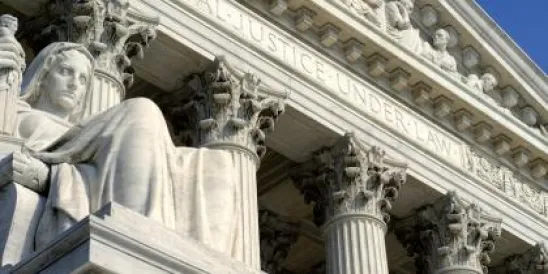Yesterday, the U.S. Supreme Court granted certiorari and agreed to consider Campbell-Ewald Company v. Gomez, in which the U.S. Court of Appeals for the Ninth Circuit held that a consumer’s failure to accept an advertiser’s settlement offer that would fully satisfy the consumer’s claim did not render moot either the consumer’s individual claim under the Telephone Consumer Protection Act (TCPA) or his putative class action, arising from the alleged transmission of unsolicited automated text messages.
Plaintiff Jose Gomez alleges that on May 11, 2006 he received an unsolicited Navy recruiting text message. The message was sent by the Campbell-Ewald Company (“Campbell-Ewald”), a marketing consultant hired by the Navy to develop and execute a multimedia recruitment campaign. In 2010, Gomez filed suit against Campbell-Ewald alleging a single violation of the TCPA. The TCPA provides for small statutory damages — $500 per violation — for unauthorized messages. Gomez sought an award of treble the statutory damages, actual damages, and reasonable attorneys’ fees and costs. In addition to seeking compensation for the alleged violation of the TCPA, Gomez also sought to represent a putative class of other unconsenting recipients of the Navy’s recruiting text messages. After Campbell-Ewald’s motion to dismiss was denied, the company tried to settle the case and offered Gomez $1,503.00 per violation, plus reasonable costs, but Gomez rejected the offer by allowing it to lapse in accordance with its own terms. The Ninth Circuit held, consistent with prior Ninth Circuit precedent, that Campbell-Ewald’s settlement offer did not moot Gomez’s personal or putative class action claims
Campbell-Ewald’s petition to the Supreme Court stated that that TCPA “has become an extortionist weapon in the hands of class action attorneys seeking to extract lucrative attorneys’ fees for class-wide settlements” and “[i]n response, many defendants, including Campbell-Ewald here, have offered plaintiffs complete relief on their individual claims at the outset — before any class is certified — agreeing to make plaintiffs whole for any TCPA violations, while sparing all the costs of protracted litigation.” Campbell-Ewald’s petition argued that cert is warranted to resolve a split among the Courts of Appeals, which disagree about whether an unaccepted offer that fully satisfies a plaintiff’s claim is sufficient to render the claim moot.



 />i
/>i

